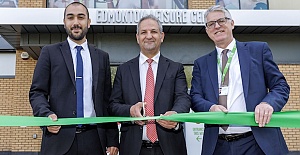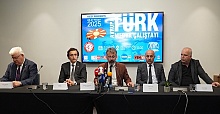Germany sought on Wednesday to make it easier for skilled workers from outside the European Union to take a job in the country, trying to alleviate chronic shortages in areas such as engineering, train driving and plumbing. Chancellor Angela Merkel's cabinet passed new immigration rules which, pending approval by parliament's upper house, aim to cut red tape for people in target industries, allowing them to get their qualifications recognised in Germany more easily. The rules would come into effect in July. "With this new decree we are jettisoning 40 percent of the old rules and leaving the door wide open for the skilled labour that can help our country progress," said Labour Minister Ursula von der Leyen in a statement. Germany has already introduced a "blue card" system making it easier to hire foreign academics and has also made it easier for foreign nurses to work here. But it now needs more train drivers, plumbers and waste-disposal workers, the minister said.
In contrast to most of the EU, where joblessness has risen as a consequence of a global economic downturn and the euro zone debt crisis, Germany's employment rate is at its highest since reunification in 1990.
But an ageing population and relatively low immigration has created a lack of workers in certain professions and sectors, which free movement of labour in the EU has failed to resolve.
The government has already introduced measures to cut bureaucracy and encourage companies to recognise qualifications from abroad, but critics say it is not enough.
Immigration to Germany is growing as its economy outperforms most of Europe. Net immigration grew to 340,000 last year from 128,000 two years earlier, with many more arrivals from southern European countries hit by the debt crisis.
But this month the Organisation for Economic Cooperation and Development (OECD) said Germany must liberalise the recruitment of foreigners to fill a projected shortfall of 5.4 million workers with vocational or tertiary qualifications by 2025.
German business welcomed the new rules. The BDA employers' federation said it would "facilitate the targeted immigration of badly-needed skilled labour also in non-academic areas", citing a particular shortage of skills in engineering and electronics.
It welcomed a "change of mentality" that would make foreign workers feel more welcome.
Many would-be migrants are put off by having to learn German, but language schools such as the Goethe Institute now report record enrolments while more German firms are starting to accept English as the language of the workplace


 Prime Minister Keir Starmer's 2025 Easter message
Prime Minister Keir Starmer's 2025 Easter message After Nesil Caliskan a by-election will be held in Jubilee ward in Enfield
After Nesil Caliskan a by-election will be held in Jubilee ward in Enfield Publishing the analysis, Labour’s Cllr Ergin Erbil said Everybody in Enfield deserves basic rights
Publishing the analysis, Labour’s Cllr Ergin Erbil said Everybody in Enfield deserves basic rights Gaza-Israel conflict Statement from Cllr Ergin Erbil, Leader of Enfield Council
Gaza-Israel conflict Statement from Cllr Ergin Erbil, Leader of Enfield Council UK AMBASSADOR TO TURKEY VISITS FETHIYE
UK AMBASSADOR TO TURKEY VISITS FETHIYE Journalists from Europe held the Turkish Media Workshop in Skopje
Journalists from Europe held the Turkish Media Workshop in Skopje The European Union called on Turkey to uphold democratic values
The European Union called on Turkey to uphold democratic values Turkish citizens in London said Rights, Law, Justice
Turkish citizens in London said Rights, Law, Justice The 'Prince of Paris' has impressed in his first EuroLeague season
The 'Prince of Paris' has impressed in his first EuroLeague season Saran Media And Euroleague Basketball Extend Media Rights Partnership for Four More Years
Saran Media And Euroleague Basketball Extend Media Rights Partnership for Four More Years Will Rangers be Jose Mourinho’s next victim?
Will Rangers be Jose Mourinho’s next victim? Jose Mourinho's Fenerbahce face Rangers on Thursday
Jose Mourinho's Fenerbahce face Rangers on Thursday Residents welcomed back to Edmonton Leisure Centre
Residents welcomed back to Edmonton Leisure Centre Barclays has become the biggest UK lender so far to cut mortgage rates
Barclays has become the biggest UK lender so far to cut mortgage rates THE SPRING STATEMENT EXPLAINED, UK ECONOMIC OUTLOOK AND GROWTH FORECASTS
THE SPRING STATEMENT EXPLAINED, UK ECONOMIC OUTLOOK AND GROWTH FORECASTS Launch of Made in Enfield gift shop to celebrate local artists and designers
Launch of Made in Enfield gift shop to celebrate local artists and designers
















